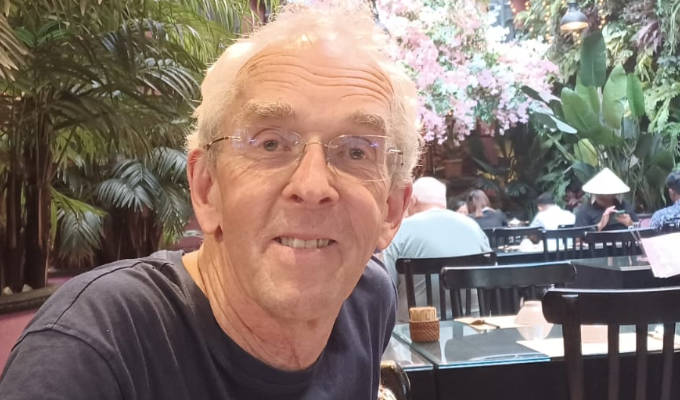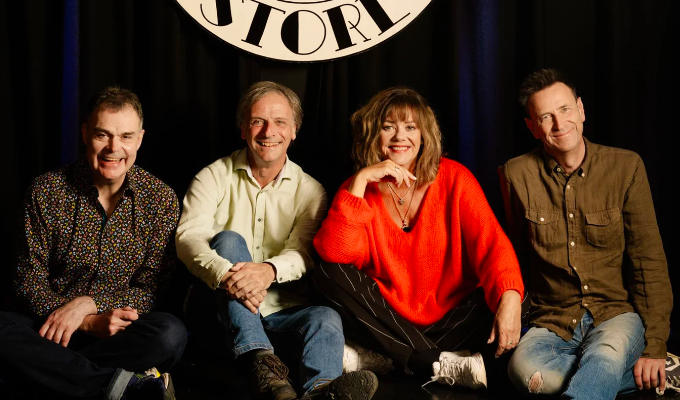
Trying to keep variety alive…. and the most stolen joke in British comedy
Part three of our series about alternative comedy at the Earth Exchange
In the third part of his series about the Earth Exchange – a vegetarian cafe in North London that was a significant venue in the early days of alternative comedy – its promoter and compere Kim Wells, above, recalls how stand-up came to dominate variety acts as the circuit started to take shape. Part one is here, and part two here.
Keeping ‘Variety’ alive
My original conception for Earth Exchange had been a ‘variety night’. In the venue’s early days, serious content like folk and poetry predominated over comedy but, as it became easier to source acts with a comedy component, I gradually phased the former out till it became predominantly comedy-oriented. But I was still strongly committed to sourcing a varied bill which reflected, as far as possible, the diverse range of acts within the ‘variety theatre’ and ‘music hall’ traditions.
My passion for variety was shared by Maria Kempinska who started the upmarket yuppie Jongleurs in Battersea in February 1983. In his book Alternative Comedy, Oliver Double quotes her as saying she wanted to ‘make it into a real variety show rather than concentrating on comedy-oriented performers’. CAST (Cartoon Archetypical Slogan Theatre), a GLC-subsidised alternative promoter, also championed variety which they referred to as ‘New Variety’.
In common with other venues in the early 1980s, Earth Exchange Cabaret hosted a relatively high proportion of variety acts as distinct from stand-up ones. Some were street performers like comic showman, Randolph The Remarkable (Phillip Herbert), who billed himself as: ‘Fire Eater Extraordinaire. Feats of skill involving fire and a blue bow of lukewarm water’. He did a very camp fire eating routine, brushing the flames against his bare chest in feigned masochistic ecstasy. For his finale, he made ‘a full frontal belly flop into a blue bowl of lukewarm water’. He then ‘went for the suction’, climaxing in the ‘remarkable feat’ of lifting up the bowl on his voluminous abdomen.
A pair of street jugglers bravely and recklessly replicated their street act, throwing flaming torches across the crowded venue, despite a very low ceiling and the obvious fire hazard.
Although I always tried to put ‘variety’ acts on the bill, the relative shortage of these – particularly from the mid-1980s onwards – meant the line up was increasingly weighted in favour of male stand-ups with the odd female comic, at that time far less common than males.
Some respite from stand-up comedy was offered by other comedy formats. These included double acts, comedy sketch ensembles, music-based comedy, impressionists and visual, prop-based comics and clowns. There were also solo comics who appeared in the guise of a comic character like Nigel Planer who, in a forerunner of his character, Neil, in ‘The Young Ones’ sitcom, presented as a dazed, mind-blown, folk-singing hippy. He billed himself as ‘The Incredible Sulk’. There were quite a few conjurors and jugglers – and the odd novelty act like a trumpet impersonator, a Punch-and-Judy Show for adults and ‘Magritte’, a mind-reading rat. These were usually ‘comedy-oriented’ in the sense of incorporating a fair amount of comedy into their acts.
There was also a lot of music-based comedy. Bob Flag, who occasionally played with offshoots of the Bonzo Dog Doo-Dah Band (like ‘Bob Kerr’s Whoopee Band’), captured much of the flavour (and chaos) of the comic jazz band tradition. This was despite a minimalistic line-up: just himself on sax and drums and B.A. Loon on keyboard. Fascinating Aida and Skint Video continued the comedic tradition of the satirical song.

Posters shows Fascinating Aida (1984) and Skint Video and Randolph The Remarkable (1985)
The former were strongly influenced by Tom Lehrer, Noel Coward and duo Flanders and Swan. With their exaggerated cut glass accents, elegant evening gowns and ‘cultured’ manners, there is something affectedly posh and upper crust English about Fascinating Aida that is particularly reminiscent of Noel Coward.
Tony Hawks' Morris Minor and The Majors (below), who, dressed as 1940s spivs with pencil moustaches and double-breasted suits, danced as well as sung. They very much embodied the music hall song-and-dance tradition.

John Hegley and The Popticians also captured the panache and wit of music hall with songs like Amoeba, ’LivingIn a Mobile Home and Eddy Don’t Like Furniture the latter ending in the immortal rhyme ‘If you give him some for Christmas he’ll return it to ya’.
Earl Okin squeezed every last drop of innuendo out of his blues song parody, Mango, so much so he upset some sensitive feminists in the audience. Ronnie Golden (Tony De Meur) - a stalwart of Earth Exchange - sang comic songs in the rock’n’roll style like Drinking At Home (with the lines ‘It’s only alcohol but I like it, like it, yes I do’ accompanied by a Mick Jagger impersonation). There were quite a few a cappella groups whom I would introduce as ‘a cappella – that’s singing without music’. These included Johnny Hubcap and The Axles (1985) who appeared on Channel Four’s Saturday Live in 1986.
The problem of curating a balanced line-up – that is, one that wasn’t exclusively made up of male stand-ups - became much more acute in the late 1980s. There were more and more very accomplished stand-ups available – enough to fill the bills of the rapidly expanding number of comedy venues - but there wasn’t anything like a proportional increase in the number of competent non-stand-up acts.
The typical bill from the mid-1980s onwards would consist of two stand-ups; one non-stand-up act such as jugglers, magicians, puppeteers, musicians or some other form of comedy act; and one or two ‘try out spots’ (who didn’t get paid). As well as compère, I would usually do a ten minute spot.
The perils of ‘method acting’
Having so few acts on each bill, I was always worried performers wouldn’t turn up. One pair of performers who were booked to do the whole first half, got waylaid en route and never arrived. They rang up the next day to say: ‘You ain’t gonna believe this but we spent the night in a police cell.’
Their act involved being dressed as punks. They had changed into their costumes before leaving home and were stopped by the police. Their punk outfits probably didn’t endear them to the police who were likely to have become even more suspicious - and riled – by their story. The notion that they were kitted out for a theatrical performance must have seemed rather implausible.
However, I suspect they were arrested mostly because they were confrontational. Before being stopped, they may well have been getting into their role as punks, applying a touch of ‘the Method’. If so, it probably wasn’t wise to try out it out on the Metropolitan Police – then, as now, not known for their delicate manners or sensitive approach to policing.
The Hall of Shame
Performing at Earth Exchange was a bit like performing in someone’s front room. The audience was a civilised, discerning and very sensitive one, especially compared to more animalistic, alcohol-fuelled venues like the Comedy Store and The Tunnel.
However, the performers were not always so refined. One stand-up comic who came in 1984 was used to performing at less refined venues. Struggling to get a laugh, he resorted to undoing his flies and pulling out his member, something that wouldn’t have stood out as particularly unusual at The Tunnel where one performer had reputedly urinated on hecklers.
 But at the Earth Exchange this sight was greeted with stunned disbelief and horror by the sober audience, some of whom were still eating their vegetarian dinners a few feet away. Talk about ‘being in your face’. It was virtually in their plates. He did have the sense to put it back where it belonged but later took it out again. At that point I burst on the stage requesting – in my normal enthusiastic way - ‘a big hand for…’ (a request met by stony silence).
But at the Earth Exchange this sight was greeted with stunned disbelief and horror by the sober audience, some of whom were still eating their vegetarian dinners a few feet away. Talk about ‘being in your face’. It was virtually in their plates. He did have the sense to put it back where it belonged but later took it out again. At that point I burst on the stage requesting – in my normal enthusiastic way - ‘a big hand for…’ (a request met by stony silence).
When Roy Hutchins later retold this story at one of his Earth Exchange gigs, he got big laughs from my ostensively fulsome request for ‘a big hand’ and from the fact that I still paid the performer, something he found unbelievable. The offending comedian soon after became a born-again Christian and apologised to me profusely every time he saw me.
It’s hard to be judgemental towards anyone doing comedy. When you’re dying, it’s easy to dig yourself deeper into your grave. You reach out, desperately searching for a lifeline, clutching at straws. But there are some straws best avoided. And certainly not clutched a second time.
What a gas! The lurking menace of a lady’s handbag
The restaurant was open for normal business on Monday evenings so it was not possible to charge admission. Instead a collection was taken in the half-time interval. It was thus crucial to finish the first half on a strong act.
One night I put on Otiz Cannelloni to finish the first half, a consistently funny performer and therefore a safe pairs of hands (or so I thought!). He did some cod mind-reading where he got a blindfolded volunteer to ‘psychically’ identify various items from another volunteer’s handbag. This involved giving very obvious clues.
He pulled out what appeared to be a perfume spray from a Brazilian’s woman’s handbag and, as she was saying ‘Be careful with that!’, sprayed it under the ‘psychic’s’ nose. It was CS gas. This had the whole audience running outside, gasping for air. After a minute or so to recover, I desperately tried to take the collection. Not unsurprisingly, no one seemed keen to donate or to come back inside.
Earth Exchange: home of ‘most stolen’ gag in British comedy
Irish comic, Ian MacPherson, was responsible for what Arthur Smith described as the most stolen line in British comedy. Ian says it just popped out as an ad lib at Earth Exchange when he ‘was faced with 150 vegetarians baying for blood’.
‘They say you play the Earth Exchange twice in your career.
Once on the way up.
Once on the way down.
Great to be back.’
Malcolm Hardee stole it and used it on a ‘pap-for-masses’ TV programme, making everyone think it was his gag.
Ian fined him ‘for theft’ and organised a performers’ strike aimed at the new venue Hardee was opening (Up the Creek), which got him to pay up. Ian was quite rightly indignant that you get credit for writing a play or a song but not a joke.
As he said to a film producer doing a documentary about Hardee who wanted Ian’s permission to use a clip of Hardee doing the gag on TV: ‘Listen, you people stole my country. I’m fucked if you’re nicking my act.’
George: a star is born (fleetingly)
George belonged to the same children’s theatre company as John Hegley. He was different from others performers being much older and having a East End working class background, accent and manner.
George claimed to have been famous once for "playing the William Tell Overture on the penny whistle while eating a saveloy at the same time.’ He went on and on about how famous he’d been. He’d packed the Palladium, he performed before all the royalty of Europe, God, he’d been famous. He was so famous the Queen didn’t command him to perform, she asked him.
He stormed the Earth Exchange. According to George, Tony Allen rushed up to him at the end said ‘I’ll make you a star’. There was something old-style, even archaic, about George’s material and style of delivery, lending his act an element of incongruity. It contained some very old, unsophisticated gags like ‘Einstein’s Theory of His Relatives’. Perhaps this partly explains why it went down so well.
George came again with different material - a social survey scientists had done about meat pies: ‘They stuck all the data into a computer and you know what came out the other end? Nuffin’. Not a blinking sausage.’ George didn’t do badly but his complete failure to match the adulation that greeted his debut meant he was bitterly disappointed by his performance. Sadly he never came again.
Norman Lovett’s big break: the Jimi Hendrix of comedy?
Norman Lovett, who later featured as Holly, the ship’s computer, in Red Dwarf, and had his own surreal sitcom on BBC Two, was a regular performer in the early and mid 1980s. He originally billed himself as ‘the cleanest act in town’.
 His style was self-referential and very deadpan. He presented his act as a work in progress, commenting continually about whether something he had just said worked or not – and debating whether it should be retained in his gradually evolving act or jettisoned. In this respect he resembled the self-referential, meta comic Stewart Lee who keeps up a constant commentary on what he is saying, explaining its logic and wondering what various segments of the audience will make of it. Lee cited him as an influence.
His style was self-referential and very deadpan. He presented his act as a work in progress, commenting continually about whether something he had just said worked or not – and debating whether it should be retained in his gradually evolving act or jettisoned. In this respect he resembled the self-referential, meta comic Stewart Lee who keeps up a constant commentary on what he is saying, explaining its logic and wondering what various segments of the audience will make of it. Lee cited him as an influence.
While still comparatively unknown, Lovett was approached by Chas Chandler – bassist with The Animals and later Jimi Hendrix’s manager – who was interested in possibly managing him. It looked as if Norman could become the ‘Jimi Hendrix of comedy’. Chandler wanted to see him perform once more before he took him on. Norman and he agreed upon the Earth Exchange as the venue.
Unfortunately that night it rained and the audience was sadly depleted. There were insufficient numbers to create the sense of a performance, a situation made worse by the absence of a microphone and stage lighting.
From the outset, Norman was struggling to win over the small audience, getting the odd polite laugh but little more. But then disaster struck. In walks a long-haired, disreputable relic from a 1960s’ rock band – and, talking across Norman’s performance, blurts out: ‘Hello Chas. Remember me?’ It was clear from Chas's exasperated grunt that he knew him but deeply regretted doing so.
In that moment, Norman’s chance of a big break evaporated as he was totally and irreversibly upstaged by the intruder who continued to conduct a loud, irreverent one-sided conversation with Chandler. I felt very sad for Norman and partly responsible for his poor showing by not providing the right context for him to show his true potential.
• Part Four: Working in a PC hotbed, falling foul of the feminists, and the final curtain
• Anyone with Earth Exchange memories or mementos they would like to share with Kim can contact him on kim.wells1@tiscali.co.uk
Published: 21 Jun 2024






